In another “What is Aleppo moment,” Jill Stein, perennial supporter of the Putin-Assad war of annihilation against the Syrian people, has discovered that the fighting has nothing to do with a popular uprising against a ruthless dictator and a brutal response, but a secret war over pipelines. She found enlightenment i n an article published on December 2, 2015, on an Australian news website which relied mostly on an essay published on in Foreign Affairs. The interesting thing is that this essay is almost unrelentingly anti-Putin. This can be seen from how it frames the question it seeks to answer:
n an article published on December 2, 2015, on an Australian news website which relied mostly on an essay published on in Foreign Affairs. The interesting thing is that this essay is almost unrelentingly anti-Putin. This can be seen from how it frames the question it seeks to answer:
“Why, ‘logically’, would a country buckling under the strain of a crippled economy and which has itself been a recent victim of extremist terror, open up a second front of military operations far away from its traditional theatre of military engagement in the former Soviet space? And what else, other than ulterior motives to those officially stated, could explain Russia’s targeting of Syrian groupings other than ISIS strongholds?”
It continues by depicting Putin’s intervention into Syria’s oil politics as that of a colonial master ordering its subject satrap around:
And so, in 2009, Qatar proposed to build a pipeline to send its gas northwest via Saudi Arabia, Jordan, and Syria to Turkey, an investment of billions of dollars up front that would reduce transportation costs over the long term. However, Syrian President Bashar al Assad refused to sign the plan; Russia, which did not want to see its position in European gas markets undermined, put him under intense pressure not to.
Of course, other powers weighed in with their own interests, but the essential issue was how Russia was focused on protecting its oil weapon, which it was wielding against Europe.
Pipelines or People’s Lives?
These past two years has seen an uptick in interesting in this topic. The first recent article I’ve seen on this theme was published by the Carnegie Endowment for International Peace in November 19, 2015; it above all challenged the weight of oil considerations in Russia’s political calculations, including the supposed importance of blocking an alternative to Russian control for oil in the event of a Qatari-Turkish pipeline.
The latest round in this debate was started by a post by Robert F. Kennedy, Jr., in a August 29, 2016, post on EcoWatch, which was republished on Reader Supported News on February 25, 2016. The article argues that “what we call the “war on terror” is really just another oil war.”
This was followed by the anti-imperialist journalist and supporter of the Assad government’s cause Gareth Porter in an article posted to Truth-Out on September 21, 2016, where he presented his long-standing belief that the Syrian war was a result of “the the primordial interest of the US permanent war state in its regional alliances.” (Parenthetically, Porter links to a different article by Kennedy than the one he’s answering, which is quite good and unobjectionable politically.)
From the other end of the spectrum, Clay Claiborne writes in an April 29, 2016, post that the obsession with pipelines reduces the brave Syrian resistance to pawns in a great power game and ignores their motivation in absorbing incredible amounts of suffering in pursuing their aspirations.
Along the same lines, the radical journalist Steve Weissman writes in a September 9, 2016 post that the focus on American interests in the Syrian war actually detract from the interests of those who are doing the fighting and dying in the struggle against the Assad dictatorship.
These last two pieces are also challenges to Jill Stein an her Green Party’s positions on the Syrian war.
Identifying Russia’s major strategic interests in Syria can help to make sense of a conflict so brutal when explaining it in terms of naked power politics, state dysfunction, and warped ideology seem inadequate. However, the contention that Russia’s involvement in Syria is influenced by natural gas interests is farfetched.
